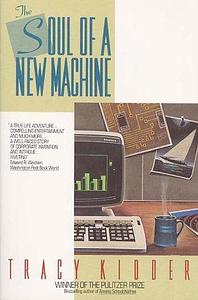Take a photo of a barcode or cover
funny
informative
inspiring
relaxing
medium-paced
emotional
informative
inspiring
relaxing
slow-paced
There are absolutely parts of this book that are fascinating. If I read it as a “period piece” and appreciate the time in which it was written, it is useful in the way that learning to program a PDP-8 was useful (and even fun
adventurous
funny
informative
inspiring
sad
medium-paced
One of the "must read" classics of IT literature. A story of human passion and the beginnings of computer history.
informative
inspiring
tense
fast-paced
Read this in the mid-80's as a young teenager. The book made a big impression and I remember being deeply fascinated.
Just reread it after many years in the IT business giving a different perspective. Still a great read.
Just reread it after many years in the IT business giving a different perspective. Still a great read.
A solid book on what took to develop a device (mini computer) that relied on software, hardware, and mechanical engineering. While the technology is outdated and the management style is dated: the story still captures the thrill of working on something magical.
Even though the book is 40 years old, much of development process it describes is very reminiscent of some of the big software projects I've been part of. I guess some things never change.
I've been meaning to read this book for literally decades, ever since I first got involved in IT in the mid-1980s. I finally mooched a copy. Maybe it's too late to read it, since it's really history now rather than current affairs. It's still an interesting read though; you don't have to know anythong about computers to read it, because it's about the people in the team that built Data General's first 32-bit computer, using the latest techniques available at that time. They were passionate about what they were doing and the book details all the manouevring and office politics that went into getting a budget for the project, and getting the team to put their all into it, neglecting families, friends and hobbies. Kidder does an excellent job of explaining technical details in terms that a non-specialist can understand.
I did enjoy it because to tell the truth I hadn't really thought before about exactly how you design a new computer with only very limited tools to help you. The thought of having to fiddle about making all the connections on circuit boards with tiny bits of wire is mind-boggling. It must be quite different now, but I suspect the people haven't changed much.
If you want to read similar books about more recent inventions, I can recommend Robert X. Cringely's [b:Accidental Empires|27652|Accidental Empires How the Boys of Silicon Valley Make Their Millions, Battle Foreign Competition, and Still Can't Get a Date|Robert X. Cringely|http://photo.goodreads.com/books/1167882189s/27652.jpg|28257], an entertaining and sometimes bitchy account about the development of the personal computer (in its widest sense), and John Naughton's [b:A Brief History of the Future|804069|A Brief History of the Future|John Naughton|http://photo.goodreads.com/books/1178518869s/804069.jpg|790028], an account of the invention of the Internet and the World Wide Web. Both will give you a different insight into the computer in front of you.
I did enjoy it because to tell the truth I hadn't really thought before about exactly how you design a new computer with only very limited tools to help you. The thought of having to fiddle about making all the connections on circuit boards with tiny bits of wire is mind-boggling. It must be quite different now, but I suspect the people haven't changed much.
If you want to read similar books about more recent inventions, I can recommend Robert X. Cringely's [b:Accidental Empires|27652|Accidental Empires How the Boys of Silicon Valley Make Their Millions, Battle Foreign Competition, and Still Can't Get a Date|Robert X. Cringely|http://photo.goodreads.com/books/1167882189s/27652.jpg|28257], an entertaining and sometimes bitchy account about the development of the personal computer (in its widest sense), and John Naughton's [b:A Brief History of the Future|804069|A Brief History of the Future|John Naughton|http://photo.goodreads.com/books/1178518869s/804069.jpg|790028], an account of the invention of the Internet and the World Wide Web. Both will give you a different insight into the computer in front of you.


